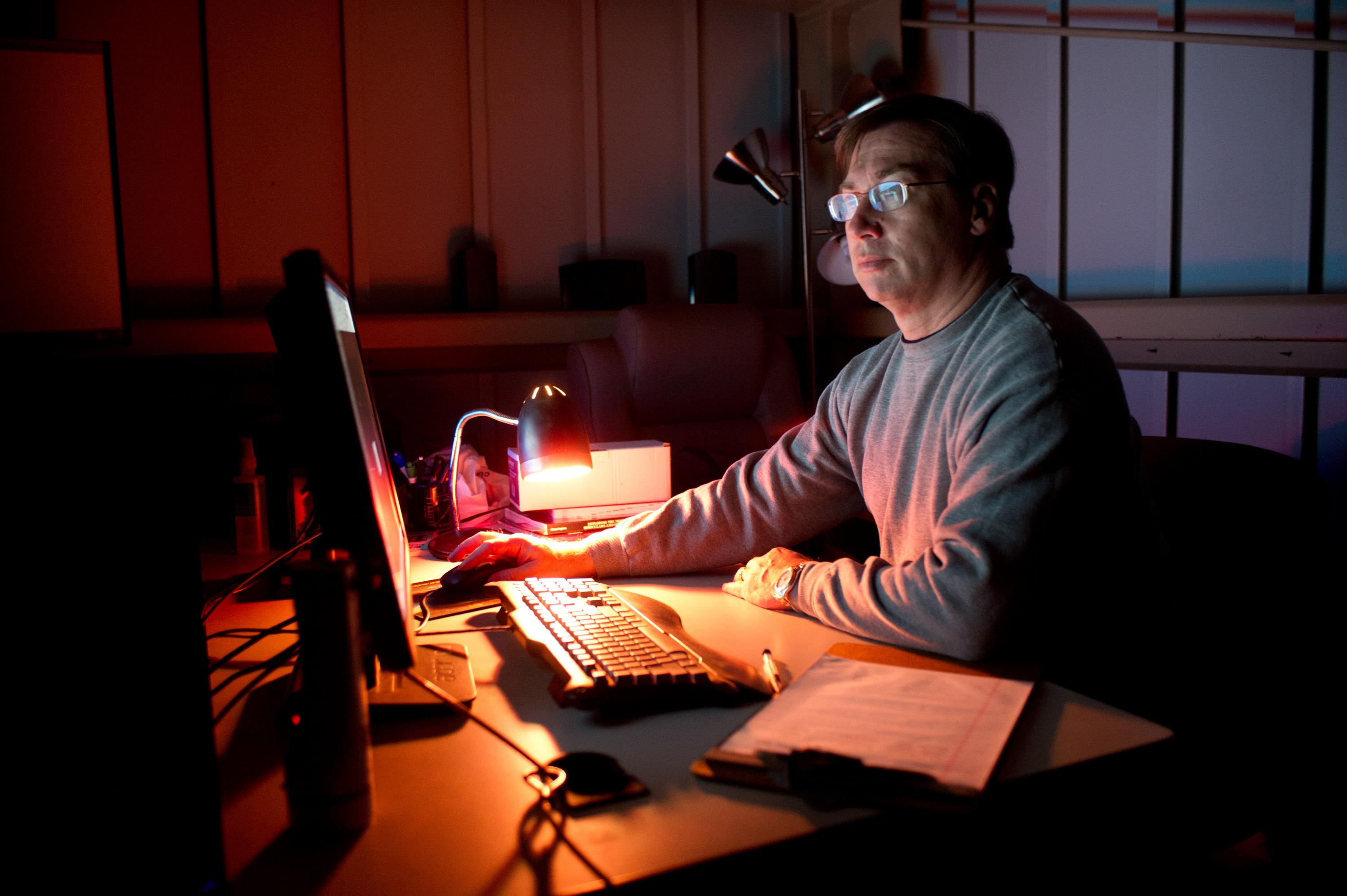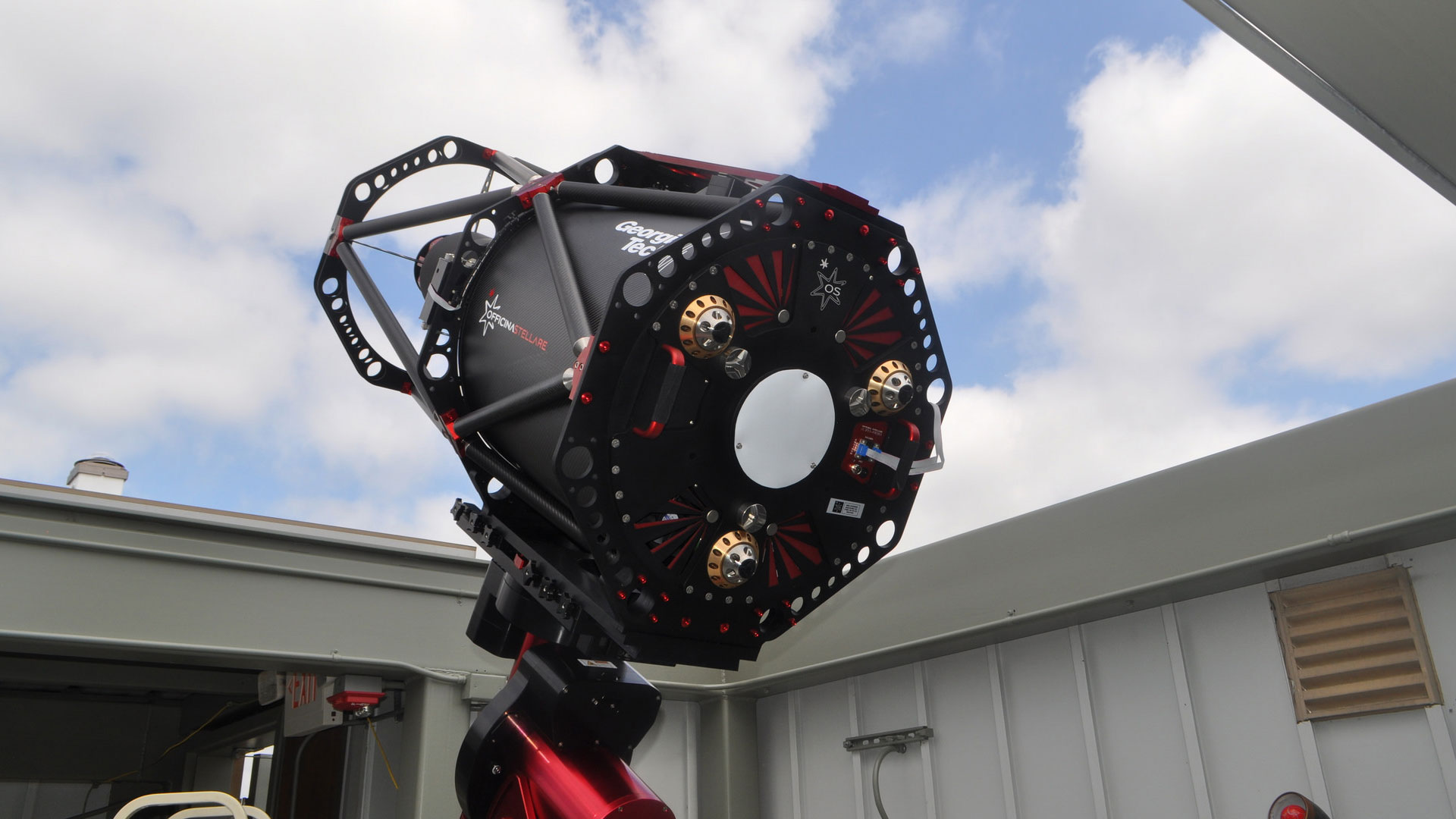On May 7, as a full moon came into focus in the night sky, several hundred computer screens lit up for a showing of the evening’s "supermoon" Flower Moon. Through a live stream on YouTube, curious observers tuned into the Georgia Tech Observatory’s first online public night, and were treated to live looks and a guided tour of Venus and Earth’s moon.
Since the Observatory opened in 2007, public nights have traditionally been held on the roof of Howey Physics Building, where four telescopes reach deep into the night sky, and visitors of all ages gather to learn about the wonders of the universe together. But with this year’s campus closures and event cancellations due to COVID-19, spring and summer nights at the Observatory were shaping up to be rather quiet ones — until Observatory Director Jim Sowell teamed up with a colleague to quickly take the outreach program online.
The two-man crew of Sowell and telescope operator John Wallom directed Tech’s inaugural online public night at the Observatory, focusing a telescope connected to a live stream for an in-depth tour of Venus and the moon. Moving from craters to mountains to “lunar maria” — large, dark, basaltic plains on Earth's moon, formed by ancient volcanic eruptions — Wallom controlled the telescope and handled telecommunications, while Sowell explained the topographies and histories of two of the brightest celestial objects that light up our night sky.
“I have always enjoyed showing views of celestial objects to others,” says Sowell. “It is my opportunity to give a person a peek through a window into the universe.”
During a typical Observatory night, hundreds of curious students and visitors flock to Howey to see the wonders of space. And when Sowell shows visitors planets in person, he says their live reactions confirm his belief in the magic of studying the stars.
“The best aspect about my job is the excitement people share when they see the cratered surface of the moon,” says Sowell. “Many often squeal! It is the celebrated joy of personal discovery and experience which is why astronomers host such events.”
While the adjustment to an online public night prevented Sowell from seeing those reactions in person, he shared that public feedback from far-flung viewers in Florida, Tennessee, and Brazil affirmed the night as a success.
Sowell notes that observatories across the nation carry the responsibility of making astronomy accessible to the public. He says that hosting public nights, that bring the wonders of astronomy to the Georgia Tech community and beyond, has always been a focus for the Observatory. Public nights can also foster curiosity and interest in exploring our universe at an early age.
“I have been in love with astronomy and the night sky since I was very young,” says Sowell. “I got my first telescope when I was seven years old.”
The work of the Georgia Tech Observatory has grown and evolved over time. Several courses, research endeavors, development of the Georgia Tech Astronomy Club, and outreach to the greater Atlanta area are centered as critical facets of the Observatory’s efforts. One example of this work includes a current collaboration between several researchers from the Daniel Guggenheim School of Aerospace Engineering and several GTRI scientists and engineers, who have teamed up to use the Observatory’s telescopes to measure characteristics of earth-orbiting spacecraft.
Sowell shares that one long-term goal is incorporating astronomy into the educational framework for younger students, with the intention of fostering an early interest in astronomy and general scientific discovery.
“Astronomy has the disadvantage of being a nighttime observing event, so it is obviously not done during the school day,” says Sowell. “Getting many students to an observatory is difficult due to family circumstances, extra-curricular aspects, and limits on the number of visitors.”
Through events like Sowell’s new online public night series, students can now learn about astronomy any time — from the classroom or from their homes. Sowell is also growing a partnership with the Air Force Research Lab in Maui, Hawaii, where he’s using the six-hour time difference to bring nighttime in the Hawaii skies to daytime classrooms in Atlanta.
“I remotely control the telescope while giving an in-person presentation to a classroom,” he explains.
Sowell also hopes to make the online public nights more interactive for students. One effort is to add web-based controls so that K-12 teachers can operate the telescope on their own while looking at Earth’s moon. This way, students and teachers will play an active role in their astronomical discoveries.
“Research has shown that if teachers do not spark students’ enthusiasm for science by the seventh grade, the students, probably, will remain forever uninterested,” says Sowell. “This general problem is particularly pronounced for the under-represented groups that include women, minorities, and lower socioeconomic students, who tend to be less involved in STEM subjects.”
Sowell adds that astronomy is the combination of concepts that cut across several disciplines — earth science, physics, biology, history, religion, and other subjects. He hopes that young students exploring outer space can see the wonder of the universe, and that they’ll be encouraged to learn and discover even more about the universe.
“Because of the school shutdowns around the world, we are trying to accelerate the development of web-based controls so that any astronomer in Europe, Africa, and South America can give the same type of outreach program we had initially planned for just the Georgia area,” says Sowell. “We have an expertise we want to share with the world, but we need funding to complete the web-based telescope control programming quickly.”
For those interested in learning more about astronomy, the next public night will be live streamed on May 28 at 9:30 PM on the Georgia Tech Observatory YouTube, weather permitting. Mark the date to enjoy a guided tour to the marvels of our universe — from wherever you may find yourself in it!
For More Information Contact
Grace Pietkiewicz
Communications Assistant
College of Sciences
katiegracepz@gatech.edu




